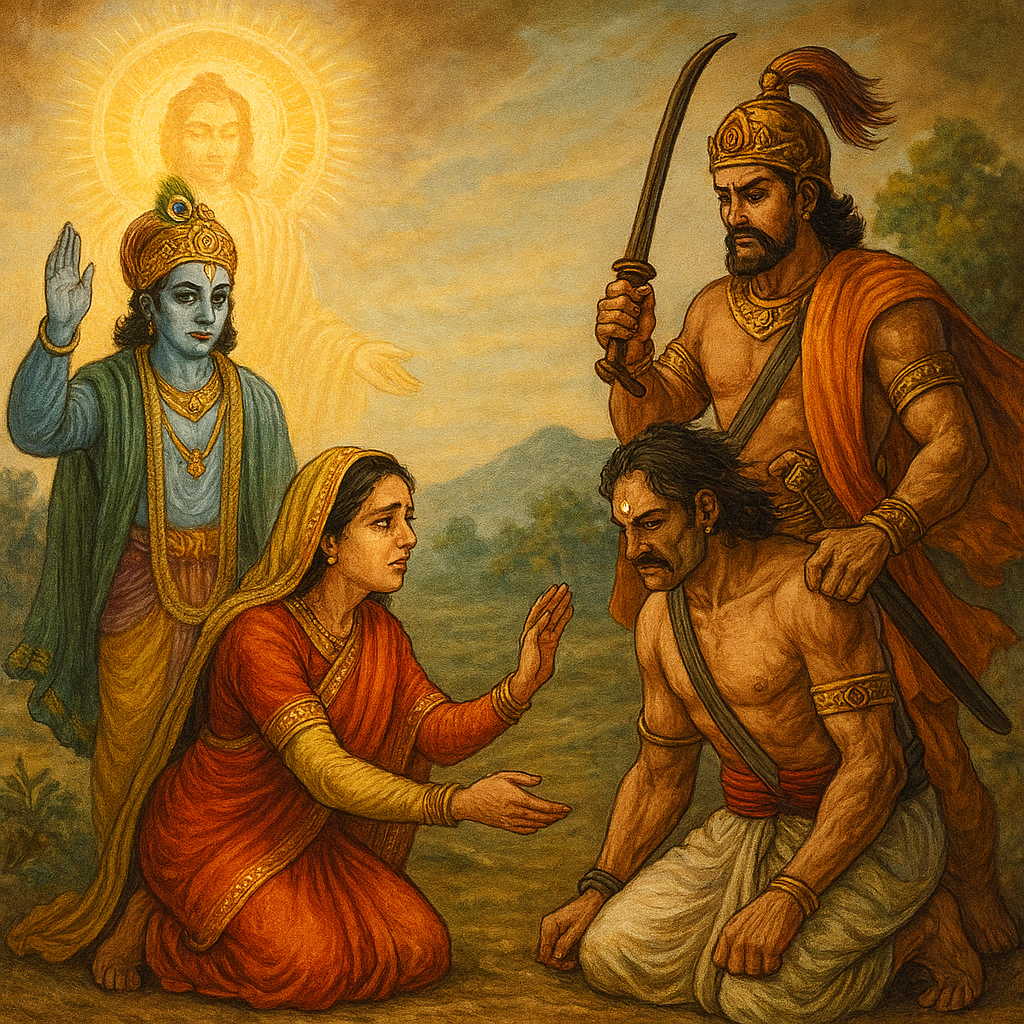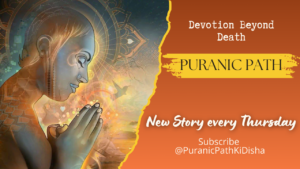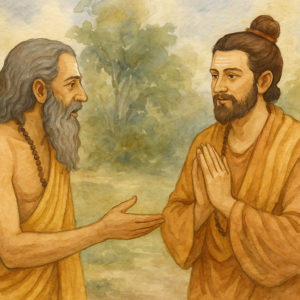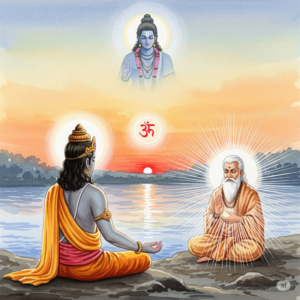In today’s world, where anger often fuels conflict and quick judgments dominate relationships, the idea of balancing justice with compassion feels distant. What if we could draw inspiration from an ancient tale, rich with lessons of courage, empathy, and hope?
Imagine a mother forgiving her children’s assassin, a warrior holding back his righteous fury, and the Divine stepping in to protect the future. These are not just fragments of a myth but a timeless story that resonates deeply with our modern struggles—conflict resolution, compassion in chaos, and the power of grace in despair.
Curious to learn how a divine shield saved a future king and how compassion triumphed over vengeance? Read on to uncover the awe-inspiring story of Parikshit’s survival and the enduring wisdom it brings to our lives today.
The Eternal Shield: The Story of Parikshit’s Survival and Dharma’s Triumph
Sutji, the great narrator, began his discourse by setting the scene—a serene and sanctified land. Nestled on the western shore of Brahmanand Saraswati lies the Shamyapras Ashram, a haven of peace and wisdom. Nearby lies the ashram of Sage Vyasa, It was here, amidst the tranquil beauty of nature, that Ved Vyasa commenced the composition of the Bhagavata Purana.
Sutji unfolds the story of King Parikshit, the grandson of Arjuna and Stories of Pandavas. From protecting Parikshit to guiding the Pandavas during the war and their trials, Lord Krishna’s divine hand was evident throughout. The Bhagavata Purana is an embodiment of Krishna’s eternal presence and his unending grace.
A War’s Bitter End and the Seeds of Compassion
The Kurukshetra war had concluded, leaving a trail of destruction and grief. On one side, Bhima struck the fatal blow to Duryodhana, ending the Kaurava legacy. On the other hand, Ashwatthama, Guru Drona’s grief-stricken son, committed a heinous act by slaying the sleeping sons of Draupadi, the Pandavas queen. This act was meant to be a “gift” for his dying ally, Duryodhana, but even he condemned such cruelty.
Draupadi’s heart broke upon hearing of her children’s death. In this harrowing moment, Arjuna, a warrior bound by dharma and a devoted husband, turned to Draupadi. Seeing her devastated state, he vowed: “I will sever Ashwatthama’s head with an arrow from my Gandiva and lay it at your feet. After we complete the last rites of our sons, you shall perform your ablutions with his head placed under your feet.” With this solemn promise, Arjuna mounted his chariot with Lord Krishna, and set out to pursue Ashwatthama.
Ashwatthama, saw Arjuna approaching him filled with anger. Ashwatthama got desperate and seeing death Infront in form of Arjuna, unleashed the dreaded Brahmastra—a weapon of immense destructive power. However, he lacked the knowledge to retract it. The intense and blinding light of the Brahmastras spread across the skies, resembling the blazing sun and the fire of the apocalypse. As Ashwatthama unleashed his Brahmastra, threatening all life, Arjuna, under the guidance of Lord Krishna, countered it with his own. The clash of these celestial weapons caused a destructive force so immense that it seemed to consume the world itself, likened to a cosmic firestorm. Witnessing this catastrophic energy, Krishna urged Arjuna to withdraw the Brahmastras to prevent the annihilation of creation. Following Krishna’s divine counsel, Arjuna recalled the weapon, averting unparalleled destruction and restoring balance.
Arjuna captured Ashwatthama, binding him as if he were an animal, and prepared to bring him to the camp near the battlefield. Along the way, Lord Krishna advised Arjuna to execute him, condemning the heinous act of killing innocent, sleeping children—a deed only a demon could commit. However, Krishna’s words were a test of Arjuna’s righteousness. Despite his immense grief, Arjuna chose the path of dharma and refrained from killing the son of his Guru. Instead, he brought Ashwatthama to the battlefield camp and presented him before Draupadi, who was mourning the tragic loss of her sons.
The Heart’s Radiance: Forgiveness Over Vengeance
Draupadi, though overcome by grief, exhibited unparalleled compassion. She saw Ashwatthama—the son of the Guru—bound like an animal which was a devasted sight, so pleaded for his release. She asked King Yudhisthir “Is it just to punish him so severely as he is the son of our Guru who gave all of us immense knowledge? His mother has already suffered the unbearable losses,” Draupadi reasoned. Her empathy transcended personal pain, reflecting her adherence to Dharma—justice imbued with compassion.
Even amidst her sorrow, Draupadi advocated for mercy, sparking a debate among the Pandavas. Everyone agreed with Draupadi but Bhima’s call for retribution clashed with Draupadi’s plea for forgiveness. Krishna, embodying divine justice, proposed a resolution that satisfied both perspectives. Following Krishna’s guidance, Arjuna removed the radiant gem from Ashwatthama’s forehead—the source of his divine power—effectively punishing yet sparing him.
The Divine Shield of Parikshit
After the tragic war, the Pandavas along with Lord Krishna, King Yudhishthira, the grief-stricken Dhritarashtra, Gandhari, Kunti, Draupadi and Subhadra performed last rites at the banks of river Ganga for their loved ones and sought solace. As peace began to settle, Lord Krishna also took a leave from every one and mounted his chariot with Uddhav and Satyaki to start his journey back to Dwarka, a new threat emerged. Ashwatthama, still harbouring hatred, unleashed another Brahmastra, this time targeting the unborn child of Abhimanyu in Uttara’s womb, seeking to extinguish the Pandava lineage.
In sheer terror, Uttara ran to Krishna, crying, “Protect me! Only you can save my child!” Krishna, moved by her plea, deployed his Sudarshan Chakra and enveloped her womb in a protective shield of divine energy. The Brahmastra, unstoppable by mortal means, was subdued by Krishna’s power. Thus, the unborn Parikshit was miraculously saved, ensuring the continuation of the Pandava legacy.
Everyone present there expressed their heartfelt gratitude to Lord Krishna, acknowledging His unwavering support and protection during times of despair. Kunti, in particular, offered a prayer of thanks, recalling how Krishna had stood by the Pandavas through their trials and safeguarded their lives. She requested Him to visit Hastinapura before departing for Dwarka. Graciously accepting Kunti’s request, Lord Krishna accompanied the Pandavas to Hastinapura to attend King Yudhishthira’s ceremony of becoming the Chakravarti Samarat, after performing Ashvamedha yagya under the guidance of Krishna, for further blessing the auspicious occasion with His divine presence.
Closing Thought
In the age of strife and quick judgment, Draupadi’s compassion reminds us of the transformative power of forgiveness. Ashwatthama’s punishment illustrates that justice does not always require annihilation but a mindful balance that leads to reform. Krishna’s role as the protector of Parikshit symbolizes hope—a reminder that even in the direst circumstances, divine grace can alter the course of destiny.
In today’s world, where anger often escalates conflicts, the lessons from this story call for empathy and thoughtful action. As families grapple with misunderstandings or societies face discord, embracing forgiveness, like Draupadi, can bridge divides. Balancing justice and compassion, as Krishna advocated, can transform personal and societal relationships.




What you’ve written echoes deeply — like a voice carried through a peaceful valley of thought. Reading this is pure joy and a true inner journey.
Thank you so much for taking the time to read and share your thoughts 🙏
Your appreciation truly means a lot. It’s blessings and encouragement like yours that keep the Puranic Path alive — a journey of devotion, wisdom, and inner transformation. May these stories continue to inspire and guide us all toward the Divine. 🌺
🎥 Watch the stories on YouTube:
👉 https://www.youtube.com/@PuranicPathkiDisha
📖 Prefer reading instead of watching?
👉 Visit: https://puranicpath.com/